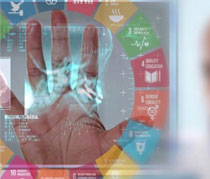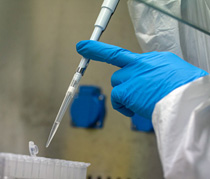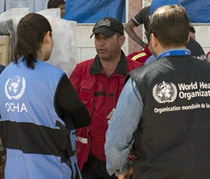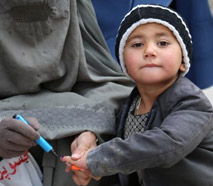

Transforming WHO

To achieve our other strategic objectives, we need to change the way WHO does business. Transforming WHO itself is therefore a core part of our strategy.
WHO Transformation is a global project involving every level of the Organization. Key priorities in the Eastern Mediterranean Region in 2019 included:
reviewing and reconfiguring offices and departments in the Region;
reinforcing our values and organizational culture;
helping to develop future health leaders;
strengthening the evidence base for our work with countries; and
enhancing partnerships with our United Nations sister agencies and other stakeholders.
Optimizing our structures and resources
A major project has been underway since 2018 to systematically review all WHO’s resources and structures in the Region with the aim of ensuring that they align with our strategic priorities. By the end of 2019, functional reviews of 17 country offices had been completed, and there had also been reviews of the emergencies and polio programmes as well as the communications, resource mobilization and partnership functions in the Regional Office.
Informed by these reviews, the Regional Office was comprehensively restructured; the new organigram is shown in Annex 1 of this report.
Functional reviews of other country offices and Regional Office departments are set to continue into 2020 and beyond. Coupled with other initiatives such as the creation of a new set of key performance indicators, these reviews should help the Organization’s management leverage our resources to best effect and maximize our impact within countries.
Reinforcing our values
Effective change is not merely structural, and the WHO Transformation process also includes strong efforts to foster a positive, innovative culture among our workforce. The WHO Values Charter is a crucial element of those efforts. The Charter was developed through an open conversation among staff at all levels of the Organization with the aim of articulating the principles that should govern all WHO’s work. Five core values
of WHO were identified: Trusted to serve public health at all times; Professionals committed to excellence in health; Persons of integrity; Collaborative colleagues and partners; and People caring about people. Ceremonies to launch the Values Charter were held in the Regional Office and country offices, and it is now an important point of reference for all staff.
Encouraging emerging talent
WHO is proud to employ able professionals from all over the world. As Annex 2 shows, our staff in the Eastern Mediterranean Region in 2019 were drawn from more than 50 countries. While we remain committed to attracting talent wherever it can be found, we are also keen to engage future health leaders from within the Region.
One of the 10 key initiatives for 2019 set by the Regional Director was to build capacity among future public health experts by promoting and streamlining internship and fellowship programmes in the Region.
The fellowship@EMRO programme was launched in August 2019, targeting young professionals from middle- and low-income countries of the Region. More than 1000 applications were received over the summer; and following a rigorous screening process, 17 early career health professionals were recruited for a three-month period and placed in various departments in the Regional Office.
Strengthening evidence for policy
The WHO Values Charter recognizes that our work should be guided by “the best available science, evidence and technical expertise”. However, obtaining such evidence is not straightforward. Previous analyses have identified significant challenges with regard to using evidence for health policy-making in the Region, ranging from gaps in the availability of reliable, relevant and timely information through to problems in converting that information into useable products and ensuring that those products are used consistently by WHO and by policy-makers in our Member States.
Tackling those challenges has been a longstanding aim of WHO in the Region, and our work took a huge step forward in 2019 when the Regional Committee adopted a new regional framework for improving national institutional capacity for use of evidence in health policy-making.
The new framework provides a systematic but flexible approach to help strengthen evidence-based policy-making in every country of the Region, recognizing that different countries have different needs and priorities (see Figs. 9 and 10).
Countries are encouraged to take advantage of all potential sources of evidence, including routinely collected data as well as research, and regional and global knowledge products that could be used to inform national policies.
A new Evidence for Policy team has been created in the Regional Office as part of the recent restructuring, and will support countries in implementing the framework.
Further steps to strengthen health research in the Region included the re-establishment of the Advisory Committee for Health Research. The Committee comprises leading researchers and is tasked both with advising the Regional Director on policies to support research development in the Region and with fostering coordination and harmonization between research at national, intra- and inter-regional levels.
Meanwhile the Regional Health Observatory is being comprehensively redeveloped to provide a user-friendly portal for authoritative data and information on health determinants and risk, health status and health system responses.
Enhancing partnerships
WHO is a collaboration between the Organization’s staff and our Member States, and we also seek to amplify our positive impact through partnerships with other organizations, including other United Nations specialized agencies, nongovernmental organizations, funders, academia, civil society and the private sector.
Partnership is at the heart of our regional vision, which commits WHO to establishing an Alliance for Health for All by All with key partners and stakeholders in the Region. As part of that project, a preparatory meeting was held in November 2019 with the aim of hosting a Regional Health Forum and launching the Regional Alliance the following year.
We also worked to help promote the Global Action Plan for Healthy Lives and Well-being for All, a worldwide initiative to improve collaboration for health among multilateral agencies. The Plan is being piloted in five countries of the Region (Djibouti, Egypt, Jordan, Lebanon and Morocco), and others are set to join.









